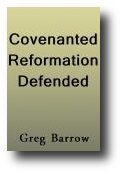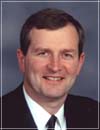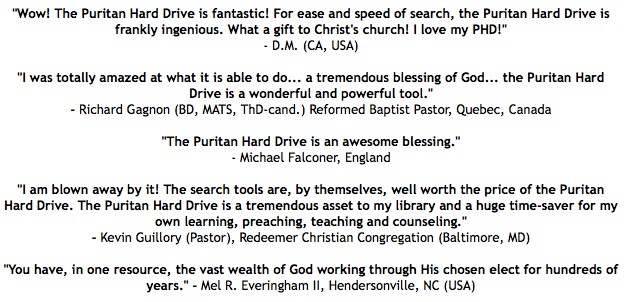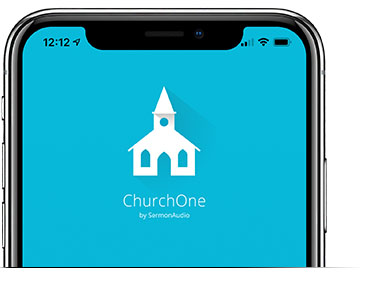 Loading... Please wait...
Loading... Please wait...Pastor Scott Brown, on the left in the video above, is the Director of the National Center for Family-Integrated Churches (NCFIC)
Resource Categories
- PURITAN HARD DRIVE REVIEWS
- PASTOR ROB VENTURA ON THE PURITAN HARD DRIVE
- DR. VODDIE BAUCHAM, JR. ON THE PURITAN HARD DRIVE
- R. C. SPROUL ON SWRB
- DR. JOEL R. BEEKE ON THE PURITAN HARD DRIVE
- PASTOR GREG L. PRICE ON THE PURITAN HARD DRIVE
- DR. MATTHEW MCMAHON ON THE PURITAN HARD DRIVE
- PASTOR SCOTT BROWN ON THE PURITAN HARD DRIVE
- PASTOR W. J. MENCAROW ON THE PURITAN HARD DRIVE
- JOAQUIN FERNANDEZ ON THE PURITAN HARD DRIVE
- PASTOR DAVID SILVERSIDES ON THE PURITAN HARD DRIVE
- JOHN HENDRYX ON THE PURITAN HARD DRIVE
- PASTOR KEVIN GUILLORY ON THE PURITAN HARD DRIVE
- RICHARD BENNETT ON THE PURITAN HARD DRIVE
- DR. KENNY RHODES ON THE PURITAN HARD DRIVE
- JUSTIN RAWSON ON THE PURITAN HARD DRIVE
- PASTOR JAMES WALLACE ON THE PURITAN HARD DRIVE
- PASTOR RICHARD GAGNON ON THE PURITAN HARD DRIVE
- PASTOR JOE HAYNES ON THE PURITAN HARD DRIVE
- DR. STEVEN DILDAY ON THE PURITAN HARD DRIVE
- PASTOR ANDREW COMPTON ON THE PURITAN HARD DRIVE
- TERENCE ELLARD ON THE PURITAN HARD DRIVE
- PASTOR JERRY JOHNSON ON THE PURITAN HARD DRIVE
- PASTOR DAVID PETRIE ON THE PURITAN HARD DRIVE
- JIM DODSON ON THE PURITAN HARD DRIVE
- PASTOR BRIAN SCHWERTLEY ON THE PURITAN HARD DRIVE
- PASTOR PHIL GIBSON ON THE PURITAN HARD DRIVE
- MEL R. EVERINGHAM II ON THE PURITAN HARD DRIVE
- PAUL BLYTH ON THE PURITAN HARD DRIVE
- STEVE KETTLER ON THE PURITAN HARD DRIVE
- D. M. (CALIFORNIA) ON THE PURITAN HARD DRIVE
- MICHAEL CAUGHRAN ON THE PURITAN HARD DRIVE
- WIILIAM NOPPER IV ON THE PURITAN HARD DRIVE
- LINDA THERIAULT ON THE PURITAN HARD DRIVE
- WILLIAM WARNOCK ON THE PURITAN HARD DRIVE
- ROBERT KOH ON THE PURITAN HARD DRIVE
- WHAT'S ON THE PURITAN HARD DRIVE?
- ALL PURITAN HARD DRIVE VIDEOS
- PHD-ODE INSTALLATION VIDEOS
- COMMENTS ON SWRB
- ALL PURITAN QUOTE VIDEOS
- PURITAN HARD DRIVE SCREENSHOTS
- PURITAN HARD DRIVE MINISTRY AND DONATION OFFERS
- TABLE OF RESOURCE CATEGORIES
- Advanced Studies
- SWRB SERMONAUDIO MOBILE APP
- Apologetics
- Assurance
- Attributes and Holiness of God
- Augustine
- Banner of Truth
- Baptism
- Beginners
- Bibles (Geneva, KJV, Hexapla, etc.)
- Biblical Counseling
- BIBLICAL HD COLLECTION
- Biblical Interpretation (Hermeneutics)
- Biographies and Autobiographies
- Calvinism and the Sovereignty of God
- CALVINISM HD COLLECTION
- CALVINIST CLASSICS HD COLLECTION
- Charles Spurgeon
- Children's Books
- CHRISTIAN EDUCATION HD COLLECTION
- Christian History
- Church Government
- Civil Government and Resistance
- CLASSIC CHRISTIAN HD COLLECTION
- Classic Puritan and Reformed Sets
- Commentaries
- Contemporary Issues
- Covenant Theology and Covenanting
- COVENANTER HD COLLECTION
- Covenanters and Covenanted Reformation
- Creation and Creationism
- Creeds, Confessions and Covenants
- Cults, False Religions, Psychology, Humanism
- Dealing with Affliction, Suffering, and Sickness
- Debates
- Dutch Reformed
- Education and Home Schooling
- English Puritans, Covenanters and Reformers
- Family, Children, Home, and Family Worship
- First Reformation
- Five Points of Calvinism (TULIP)
- For Pastors and Elders
- For Seminary Students
- FREE PURITAN & REFORMATION MP3 AUDIO SERMONS/BOOKS
- FREE PURITAN BOOKS, REFORMATION MP3s, PDFs, VIDEOs
- George Gillespie
- God's Law, The Ten Commandments, etc.
- Greg L. Price on Headcoverings
- Heaven, Hell and the Final Judgment
- Holy Days (Lord's Day, Christmas, Easter, etc.)
- HOME SCHOOL HD COLLECTION
- Intermediate Studies
- John Bunyan
- John Calvin
- John Knox
- John Owen
- Jonathan Edwards
- Justification
- Languages, Dictionaries, Reference, etc.
- LOOK WHO LOVES THE PURITAN HARD DRIVE
- Lord's Supper (Communion)
- Marriage, Courtship, etc.
- Martin Luther and Lutheranism
- Martyrs and Persecution
- Other Protestant Works
- Predestination and Providence
- PRESBYTERIAN HD COLLECTION
- Presbyterians and Presbyterianism
- Prophecy, Antichrist, and Eschatology
- PROTESTANT HD COLLECTION
- PSALM SINGING MP3s (COMPLETE SET)
- Psalters, Psalm Singing and Music
- Puritan Facts
- PURITAN FAST SERMONS (1640-1653) - 34 VOLS SET
- Puritan Fast Sermons 1640-1653
- PURITAN HARD DRIVE
- Puritans and Puritanism
- REFORMATION HD COLLECTION
- Reformation History
- Reformed and Puritan Classics
- Reformed Baptist
- REFORMED BAPTIST HD COLLECTION
- REFORMED HD COLLECTION
- REFORMED PRESBYTERIAN HD COLLECTION
- Reformed Presbytery, RPNA Protesters, etc.
- Reformed Theology
- Reformed Worship, The Regulative Principle, etc.
- Roman Catholicism, the Jesuits, Islam, etc.
- Salvation and Evangelism
- Samuel Rutherford
- Sanctification, Prayer and Holiness
- Scottish Covenanters
- Scottish Presbyterianism
- Scripture Song MP3s (Psalms and Bibles Verses)
- Second Reformation
- Separation, Unity, Uniformity, etc.
- Sermons and Sermon Collections
- Solemn League and Covenant
- Theology and Doctrine
- Third Reformation
- Thomas Watson
- Westminster Confession, Assembly and Divines
- Authors (All A to Z)
Popular Authors
Phone Orders:
(780) 450-3730
To obtain free Reformation books, Puritan MP3s and Calvinistic videos, SWRB discount coupons, etc., add yourself to SWRB's Puritan and Reformed email list by using the form above.
- Home
- REFORMED HD COLLECTION
REFORMED HD COLLECTION
The Puritan (and Reformed) Hard Drive contains more Reformed books, MP3s and videos than any other free standing digital study tool in the history of the world- as it contains over 12,500 Reformed resources.
Moreover, it has lots of room to grow even larger through SWRB-published Puritan and Reformed books, MP3s and videos, as digital downloads, which will be integrated with the Puritan Hard Drive, as they are published in the future.
Some of these Reformed resources (books, MP3s and videos) will even be offered as updates to the Puritan Hard Drive as free downloads, while most others, even large books from 300-1000+ pages will be available as SWRB digital downloads for just 99 cents (or less)! We have over 10,000 Puritan and Reformed books, MP3s and videos already lined up for future digitization (with over 2,500 already in our possession) for this very purpose - so the Reformed content on the Puritan Hard Drive can expand even further to meet all your Reformation, Puritan, Presbyterian, Covenanter, Reformed Baptist, etc., study needs.
The Puritan Hard Drive also contains the most powerful and advanced Reformed Bible study software in the history of the world.
By God's grace and for His glory (alone), and for your growth in grace and further sanctification, we are providing you with the most excellent, effective and efficient Reformation study platform ever created.
Consequently, if you are a Reformed Christian, you don't want to miss this absolutely astonishing historic combination of the best Reformed resources with the most advanced Reformation study software, which our Lord has ordained for our generation (and the Third Reformation), and for your blessing!
For more information and edification please check out the introductory Puritan (Reformed) Hard Drive video and all the Reformed quotes below.
"God from all eternity, did, by the most wise and holy counsel of His own will, freely, and unchangeably ordain whatsoever comes to pass; yet so, as thereby neither is God the author of sin, nor is violence offered to the will of the creatures; nor is the liberty or contingency of second causes taken away, but rather established... The doctrine of this high mystery of predestination is to be handled with special prudence and care, that men, attending the will of God revealed in His Word, and yielding obedience thereunto, may, from the certainty of their effectual vocation, be assured of their eternal election. So shall this doctrine afford matter of praise, reverence, and admiration of God; and of humility, diligence, and abundant consolation to all that sincerely obey the Gospel" (The Westminster Confession of Faith, "Of God's Eternal Decree," Chapter 3:1, 8 (original edition).
"Known unto God are all his works from the beginning of the world" (Acts 15:18).
Reformed Quotes
 |
"If it be asked, then, by what things chiefly the (Reformed - ed.) Christian religion has a standing amongst us, and maintains its truth, it will be found that the following two not only occupy the principal place, but comprehend under them all the other parts, and consequently the whole substance of Christianity, viz., a knowledge first, of the right (Reformed - ed.) way to worship God; and secondly of the source from which salvation is to be sought. When these are kept out of view, though we may glory in the name of Christians, our profession is empty and vain." - John Calvin, On the Necessity of Reforming the Church, free online at: http://www.swrb.com/newslett/actualnls/NRC_ch00.htm |
 |
The Regulative Principle of Worship is God's ordained law for worship... You see there is no neutrality in the way in which we approach God in worship. Either we approach the living God according to His revealed Word (i.e. the Regulative Principle of Worship), or we approach Him according to our revealed word. Someone's word is going to expressly guide us in worship. The only question is, whose word will guide us? God's or man's? " - Greg Price, Foundation For Reformation: The Regulative Principle Of Worship, free online at http://www.swrb.com/newslett/actualNLs/REFORMATION-RPW-GP.htm. |
 |
"But the acceptable way of worshiping the true God is instituted by himself, and so limited by his own revealed will, that he may not be worshipped according to the imaginations and devices of men, or the suggestions of Satan, under any visible representation, or any other way not prescribed in the holy Scripture." - Westminster Confession of Faith, Of Religious Worship, and the Sabbath Day, Chapter 21:1, 1647, Original Edition. |
 |
"The martyrs also held covenanting to be a fit and divinely authorized means of consolidating union in a church and a nation, and of giving security to the interests of religion in both. They found confederation in the transactions of mankind; they viewed it to be based on the moral law; they saw it largely exemplified in the history of the Jews; they read prophetic intimations of the practice; and they had before them the example of the reformed churches. Besides, they were, in a measure, driven into covenanting by the plottings of their enemies. At the period of the first reformation, the National Covenant of Scotland had been prepared and gone into, when the jealousy of the nation had been awakened by the interception of letters from Rome, granting a dispensation to the Roman Catholics to profess the reformed tenets for a time; with a view, no doubt, to the ultimate overthrow of the reformed cause. The covenant united the country, and proved a means of preserving the reformed religion from the peril to which it was exposed, from the machinations of enemies. At a subsequent period, this covenant was again sworn as applying to Prelacy as well as Popery; and a Solemn League and Covenant was subsequently framed to preserve the reformed religion in Scotland, and extend it in 'England and Ireland.' These deeds formed, in those days, the Magna Charta of civil and religious liberty; and were held in the highest veneration by those who contended against the overthrow of the reformation. The offence in which these deeds were held by the enemies of the reformation, may be learned from the public odium, attempted to be thrown upon them by their condemnation and burning. But the martyrs held fast their obligation, because of that scriptural reformation which they embraced, and which they had been the means, so seasonably and efficiently, under God, of preserving." - Andrew Symington, "Religious Principles of the Scottish Martyrs," as cited in Greg Barrow ground-breaking Reformed book, The Covenanted Reformation Defended. |
 |
"If the term "Reformed" meant something, historically speaking, and theologically speaking in the age of the Reformation, and the term was changed today to mean something else, or discarded altogether, that would violate the interpretation of that word for the Reformers themselves. To the Reformers, to the Covenant Theologians of yesteryear, the historian would easily find that the term "Reformed" meant something to them. The question of this article is to answer what the term "Reformed" really meant, and should consequently mean today. To deny the definition of the word is to replace it altogether with some thing else. The definition of the word "Reformed" is not given by whim and fancy of those who wield the term to define the five solas of the Reformation, or the doctrines of grace. To use the term to simply refer to those sets of biblical propositions is to use the term as slang. The pastors and theologians of the Reformation, precisely and forcefully utilized the word "Reformed", and packed it with ideologies and history. It was a word that defined the manner of a thinker in that age. He had a certain understanding of the Bible, and a certain set of convictions. These convictions ran much further than our contemporary superficial understanding of the Solas or of the doctrines of grace. The term "Reformed" was used, and should be used, in a much larger context than that. Its definition, as we will see unfolded in this article, is restrictive and not liberal in its application, but liberal and not restrictive in its theological propositions. It fought against the ebb and flow of papal dictatorship, heretical controversy and political expediency with a precise and swift strike of the sword of Word of God. It is a word that defines the edge of theological difference with razor sharpness. If it were abused today, then that is a detriment to its history. If it were redefined today, then it is at the peril of the definer and the Reconstructionism of what others will believe such a term defined those of the past. The historian, the pastor, the theologian of today must be exceedingly careful to have their facts straight on history, for history defines the idea. Unfortunately, the term Reformed cannot be applied to every Christian who likes to cast it upon their crest. They are very right for desiring it, for who can historically counter the greatest revival past that of the coming of the Lord Jesus Christ? What doctrinal theme or theological bent will be put in place of it? Arminianism? Dispensationalism? Antinomianism? Romanism? No. The basic system of the reformers is set. And this system cannot be applied to every "theological Joe" that would like to claim it. It has already been claimed, and has already been stamped by the Word of God with approval. Look to the revivals of history for confirmation. Look to the flourishing of the church. Has Arminianism, Dispensationalism, Antinomianism or Romanism ever had a revival of religion? No they have not. (Loraine Boettner in his work, "The Reformed Doctrine of Predestination" answers that historical question by including an entire chapter on Calvinism in history.) With all that said, we will traverse biblically based history and theology in order to answer the title of this paper - What does it mean to be Reformed- Really? I do want to ensure the reader that my answer to the questions above ("Where would we look for resources on Reformed Theology?" and, "where would we find first-class Reformed theology articulated in classical form?") are validly answered by my statement "in the writings of Reformed literature." There are three areas that safely guide one to prove this out: 1) what classic Reformed Theology teaches, 2) where this "classic" aspect of Reformed Theology emerged from, and 3) what has happened to the term "Reformed" today. After surveying these 3 areas, I think we will all have to agree on the basics of "what constitutes Reformed Theology." We will know what it really means to be considered a Reformed Theologian, Reformed Pastor, or Reformed Believer. There is no doubt that the Reformed Tradition traces its historical roots to the time of John Calvin (1509-1564). Calvin, though born in Noyon, France, could be considered as a "Swiss" reformer due to his long stay at the city-state Geneva in Switzerland. The term "Reformed" is itself not ambiguous. Even the third and fourth generation reformers (and Puritans) used the term considering men like Calvin and Zwingli as prime examples of the Reformed Tradition of that time. Francis Turretin uses this term quite extensively in his work on the "Calling of the First Reformers." Thus, the term was easily acquainted with Protestantism during the 16th century as its foundation and root for definition. Reformation Theology should be primarily considered around a biblical zeal to reform the church. To be Reformed is to continually look to aligning one's self or the church at large to the Bible and the teachings of Jesus Christ. Reforming does not mean, however, that we discard the fundamental doctrines of the "Reformed Faith" in order to continue "reforming" our theology. It refers to defining theology more clearly in the process of understanding the will of God. The opposite of this would be to remove doctrines that sit as foundational to the Reformed perspective in order to make new strides in understanding revelation. An example of this may be the New Covenant Theology which is an extension of "Reformed Baptist" theology now made popular over the internet. These Baptists believe they have come upon Covenant Theology in a light that remains Baptistic while at the same time clarifying Reformed Theology to understand the New Covenant in that new light. It is not my intention to refute this position at this point. However, in all their attempts at clarity, they are overthrowing the reality of Covenant Theology as the Reformed Tradition has stated it and have repackaged Dispensationalism (again!). This is not semper reformanda (always reforming) but a departure of Reformed Theology. We would not throw away the doctrine of Christology to make room for a new "Jesus Ethic." Rather, we would further define what always exists in the basic formulae of Reformed Theology in this manner. As a result, our Christology would become more precise, not new. This is semper reformanda. Departing from Reformed orthodoxy is moving into a new teaching or doctrine not aligned with the classic Reformed Tradition. In other words, Calvin, Luther, Witsius and Owen would not agree with New Covenant Theology, and in their writings this is plain enough... Calvin then expounded what the Puritans mastered in demonstrating the need to reform the church - namely, the Regulative Principle. Calvin said that "fictitious worship" is to be rejected. He says, "I know how difficult it is to persuade the world that God disapproves of all modes of worship not expressly sanctioned by his word. The opposite persuasion which cleaves to them, being seated, as it were, in their very bones and marrow, is, that whatever they do has in itself a sufficient sanction, provided it exhibits some kind of zeal for the honor of God. But since God not only regards as fruitless, but also plainly abominates, whatever we undertake from zeal to his worship, if at variance with his command, what do we gain by a contrary course? The words of God are clear and distinct, "Obedience is better than sacrifice." "In vain do they worship me, teaching for doctrines the commandments of men," (1 Sam. 15:22; Matt. 15:9). Every addition to his word, especially in this matter, is a lie. Mere "will worship" (ethelothreeskeia) is vanity. This is the decision, and when once the judge has decided, it is no longer time to debate." Thus, unless God has changed Old Testament worship, or has given us new instructions for worship, fictitious worship is something to be rejected, and of the devil. It draws people away from God rather than near to Him. Every institution of God through the Bible, unless eradicated by the fulfillment in Christ, is to be gleaned for its meat for worship. Both Leviticus 10:3 and Matthew 15:9ff both teach us that the Regulative Principle stands firm... It should be agreed that being "Reformed" meant something to Luther, Calvin and their predecessors. It is not something we are allowed to take in "part" in the name of "reforming." We must admit that asking Calvin whether or not an abuse of the Lord's Supper is acceptable would be answered by a biblical ferocity. We could not agree that Calvin would accept an abuse of the sign and seal of baptism - he wrote extensively against its abuse in 4.16 of his Institutes. We could not agree that Calvin would allow simony in the church. Such aberrations of Reformed doctrines fired up the pen of this classic Reformed theologian and pastor. I could not, in good conscience, call myself Reformed or claim the Reformed faith if I simply believed 1/10th of what the Reformation taught. Also, I could not, in good conscience call myself Reformed or claim the Reformed faith if I simply believed 9/10ths of what the Reformation taught, and rejected the other 1/10th out rightly. I must, of necessity, embrace Reformation doctrine to claim the Reformed banner. In like manner I cannot believe 4 points of the 5 points of Calvinism and call myself a Calvinist. Those who believe the doctrines of grace know this little ploy used too well by confused Arminians who say such things. But the orthodox know they are wrong; at the very least they are extremely confused. It is much the same with the doctrines of the Reformation. You cannot reject Reformed worship, those foundational guidelines within the orthodox realm of Reformed doctrine, and say you are Reformed. You cannot discard church discipline and say you are Reformed. You cannot reject aspects of Covenant Theology and call yourself Reformed. You cannot misuse the sacraments, or deny them, and call yourself Reformed. Holding to certain biblical ideologies determines whether one is Reformed or not. In all of this, you must ask yourself, are you really Reformed?" - Dr. C. Matthew McMahon, What does it mean to be Reformed: Really? free at http://apuritansmind.com/Baptism/McMahon-WhatDoesItMeanToBeReformed.htm. |
Dr. Joel R. Beeke Reviews and Recommends
the Puritan Hard Drive

Dr. Joel R. Beeke, Puritan Reformed Theological Seminary
The Puritan Hard Drive is a massive collection of primary Puritan resources, dozens of which are very hard to find anywhere else in the world.
Any lover of Puritan literature, which, more than any other body of literature ever written, powerfully expands our minds, convicts our consciences, allures our hearts, and moves our hands, will find a treasure trove here.
- Dr. Joel R. Beeke, President and Professor of Systematic Theology and Homiletics at Puritan Reformed Theological Seminary https://puritanseminary.org/, Author of many important Reformed books (including the must read, Meet the Puritans: With A Guide to Modern Reprints, https://www.heritagebooks.org/products/Meet-the-Puritans.html), Editorial Director at Reformation Heritage Books, Editor of the Banner of Sovereign Grace Truth magazine and Pastor of Heritage Netherlands Reformed Congregation in Grand Rapids, Michigan, USA.
VIDEO INTRODUCTION TO THE PURITAN HARD DRIVE


Phone Orders:
(780) 450-3730
To obtain free Reformation books, Puritan MP3s and Calvinistic videos, SWRB discount coupons, etc., add yourself to SWRB's Puritan and Reformed email list by using the form above.
Current Top Sellers
-
1
-
2Puritan Hard Drive - On Demand Edition for Windows
$2,897.97$597.97 -
3
-
4
All Authors
- Abernethie, Thomas
- Adams, Richard
- Adams, Thomas
- Alexander, Archibald
- Alleine, Joseph
- Ames, William
- Anderson, George
- Anderson, James
- Anderson, John
- Anderson, William
- Annesley, Samuel
- Anonymous
- Apple
- Arrowsmith, John
- Ash, Simeon
- Associate Presbyterian Magazine
- Associate Presbytery of Miami
- Augustine, Aurelius
- Bailllie, Robert
- Baird, Henry
- Balfour, William
- Bannerman, Douglas
- Bannerman, James
- Barker, Matthew
- Barnes, Albert
- Barrow, Reg
- Bates, Stewart
- Bates, William
- Baxter, Richard
- Bayly, Lewis
- Baynes, Paul
- Beaton, Donald
- Begg, James
- Beveridge, James
- Beza, Theodore
- Bining, Hugh
- Binnie, William
- Black, John
- Blaike, Alexander
- Blakeney, Richard P.
- Boettner, Loraine
- Bolton, Samuel
- Bond, John
- Boston, Thomas
- Bowles, Oliver
- Bradford, John
- Brainerd, Thomas
- Breckenridge, Robert J.
- Bredenhof, Wes
- Bridge, William
- Bridges, Charles
- Bridges, Walter
- Bromhall, Andrew
- Brooks, Thomas
- Brown (of Bedford), John
- Brown (of Edinburgh), John
- Brown (of Haddington), John
- Brown (of Wamphray), John
- Brown, C. J.
- Brown, David
- Brown, Henry
- Brown, P. Hume
- Brown, Thomas
- Bruce, Robert
- Buchanan, James
- Bullinger, Henry
- Bunyan, John
- Burgess, Anthony
- Burgess, Cornelius
- Burgon, John W.
- Burns, William C.
- Burroughs, Jeremiah
- Byfield, Richard
- Calamy, Edmund
- Calderwood, David
- Calvin, John
- Cameronian
- Cardell, John
- Carslaw, W. H.
- Carter, Thomas
- Carter, William
- Caryl, Joseph
- Case, Thomas
- Cawdrey, Daniel
- Chalmers, Thomas
- Chambers, Humphrey
- Chaney, James M.
- Charnock, Stephen
- Cheynell, Francis
- Chiniquy, Charles
- Chrystie, James
- Church of Scotland General Assembly
- Clarkson, Andrew
- Clarkson, David
- Close, Albert
- Cokayn, George
- Coleman, Thomas
- Coles, Elisha
- Colquhoun, John
- Commissioners, Scottish
- Conant, John
- Cooper, William
- Corbett, Edward
- Covenanted Ministers of Scotland
- Covenanted Reformed Presbyterian Publishing
- Covenanter Magazine
- Cradock, Walter
- Craighead, Alexander
- Croskery, Thomas
- Crumpler
- Cudworth, Ralph
- Cudworth, William
- Cunningham, John
- Cunningham, William
- Dabney, Robert Lewis
- Dale, James W.
- Darling, James
- Davies, Samuel
- Defoe, Daniel
- Dell, William
- Demaus, Robert
- Dexter, Henry Martin
- Dick, James
- Dick, John
- Dickinson, Jonathan
- Dickson, David
- Doolittle, Thomas
- Douglas, Thomas
- Dunlop, William
- Dunn, Samuel
- Durham, James
- Durye, John
- Edwards, Jonathan
- Edwards, Thomas
- Elgato
- Elliott, E. B.
- Ellis, John
- Enock, Esther
- Erskine, Ebenezer
- Erskine, Ralph
- Evance, Daniel
- Faber, George
- Fairbairn, Patrick
- Fairclough, Richard
- Fairley, John
- Ferguson, James
- Fisher, James
- Flavel, John
- Fleming, David Hay
- Fleming, Robert
- Forrester, Thomas
- Foster, J. M.
- Fowler, Christopher
- Foxcroft, John
- Foxe, John
- Fraser (of Alness), James
- Fulke, William
- Fuller, Andrew
- Fulton, Justin D.
- Gamble, David
- Gauden, John
- Gaussen, L.
- Gavin, Anthony
- George, R. J.
- Gibson, James
- Gibson, Samuel
- Giffin, James
- Gilfillan, James
- Gill, John
- Gillespie, George
- Gilmour, Robert
- Gipps, George
- Girardeau, John
- Glasgow, James
- Goode, William
- Goodwin, Thomas
- Gosson, Stephen
- Gouge, William
- Gower, Stanley
- Graham, John
- Graves, F. P.
- Greene, John
- Greenhill, William
- Guinness, H. Grattan
- Gurnall, William
- Guthrie, James
- Guthrie, William
- Hall, Archibald
- Hall, Henry
- Halliday, Thomas
- Halyburton, Thomas
- Hardwick, Humphrey
- Hardy, Nathaniel
- Harper, James
- Harris, Robert
- Harris, Thomas H.
- Hayward, S.
- Henderson, Alexander
- Henry, Matthew
- Herkless, John
- Herle, Charles
- Hetherington, William
- Hewison, James King
- Heyricke, Richard
- Hicks, Gaspar
- Higher Ground
- Hill, Thomas
- Hislop, Alexander
- Hodge, Charles
- Hodges, Thomas
- Hogg, James
- Hooker, Thomas
- Horton, Thomas
- Houston, Thomas
- Howie, John
- Hughes, George
- Hurst, Henry
- Hurst, John F.
- Hussey, William
- Hutchison, Matthew
- Incase
- Innes, Taylor
- James, John Angell
- Jameson, William
- Jenkyn, William
- Jesuits
- Johnson, Robert
- Johnston, John C.
- Kennedy, John
- Kentish, Richard
- Kerr, James
- Knox, John
- Kurtz, J. H.
- Landis, Robert
- Langley, John
- Lawson, J. R.
- Lee, Samuel
- Leighton, Alexander
- Ley, John
- Lightfoot, John
- Lockyer, Nicholas
- Logitech
- London Ministers
- Lorimer, Peter
- Love, Christopher
- Lusk, Robert
- Luther, Martin
- Lye, Thomas
- M'Crie, Thomas
- M'Donald, John
- Microsoft
- Speck
- Reformers, Various
- Presbytery, Reformed
- Stalker, James
- McFeeters, J. C.
- Mitchell, Alexander F.
- Wylie, James A.
- Morison, William
- Various Authors
- Wycliffe, John
- Tyndale, William
- Whitaker, William
- Machen, J. Gresham
- Rutherford, Samuel
- Shields, Alexander
- Stewart, James
- Owen, John
- Zanchius, Jerome
- McKnight, W. J.
- McNaugher, John
- Milligan, James
- Manton, Thomas
- Mackenzie, Robert
- Peterkin, Alexander
- Todd, A. B.
- Stacy, James
- Mede, Joseph
- Symington, William
- Murray, Matthew
- Wylie, Samuel
- Willson, James R.
- Symington, Andrew
- Spurgeon, Charles
- Steele, David
- Witsius, Herman
- Mason, Archibald
- Pond, Enoch
- Newton, Isaac
- Newton, Thomas
- Vinke, Peter
- Wilkinson, Henry
- Paul, John
- Perrin, Jean Paul
- Smith, Thomas
- Stewart, Alexander
- Needler, Benjamin
- Ness, Christopher
- W. L. S. G.
- Thornwell, James Henley
- McCarty, Burke
- Macpherson, Hector
- Robinson, John
- Original Covenanter Magazine
- Synod of Dort
- Thompson, David
- M'Leod, Alexander
- Rice, N. L.
- Sumner, Charles
- Synod of the Reformed Presbyterian Church in Scotland
- Toplady, Augustus
- Traill, Robert
- Ryle, J. C.
- Magill, George
- M'Master, Gilbert
- Pressly, John T.
- Romaine, William
- Nevin, Robert
- Martin, Hugh
- Turretin, Francis
- Shedd, William G. T.
- Reid, John
- Sibbes, Richard
- Sylvester, Matthew
- Palmer, B. M.
- Scipione, George C.
- Smith, B. M.
- Steele, Richard
- Platt, S. N.
- Pollok, Robert
- Wagner, Michael
- Thompson, Elbert N. S.
- Vass, L. C.
- Vernon, S. M.
- Winchester, S. G.
- Witherspoon, John
- Parliament, English
- Pierce, James
- Session Book of the Parish of Penninghame
- Sproull, Thomas
- Sundry Ministers of London
- Westminster Assembly
- Witherow, Thomas
- Wood, James
- M'Neilly, S. R.
- McWard, Robert
- Miller, Samuel
- Milwain, John
- Ministers of the General Synod of Ulster
- Roberts, William L.
- Scott, David
- Puritan Divines
- Marshall, Stephen
- Maynard, John
- Mewe, William
- Nalton, James
- Newcomen, Matthew
- Palmer, Herbert
- Perne, Andrew
- Peters, Hugh
- Pikering, Benjamin
- Powell, Vavsor
- Price, William
- Proffet, Nicolas
- Reyner, William
- Reynoldes, Edward
- Roberts, Francis
- Salwey, Arthur
- Scudder, Henry
- Seaman, Lazarus
- Sedgwick, Obadiah
- Sedgwick, William
- Simpson, Sidrach
- Smith, Peter
- Spurstowe, William
- Staunton, Edmund
- Sterry, Peter
- Strickland, John
- Strong, William
- Taylor, Francis
- Temple, Thomas
- Tesdale, Christopher
- Thorowgood, Thomas
- Torshel, Samuel
- Tuckney, Anthony
- Valentine, Thomas
- Vines, Richard
- Walker, George
- Ward, John
- Ward, Nathaniel
- Warren, John
- Watson, Thomas
- Whincop, John
- Whitaker, Jeremiah
- White, John
- Wilson, Thomas
- Woodcock, Francis
- Young, Thomas
- M'Millan, John Jr
- Melville, James
- Oburn, William
- Smeaton, George
- Steven, William
- Thorburn, John
- Ridgeley, Thomas
- Westminster Divines
- Northern Presbytery Choir
- Swinnock, George
- Poole, Matthew
- Trapp, John
- Thomson, James Pringle
- Wallace, James
- Scot, William
- Pink, A. W.
- MacLean, William
- Shaw, J. W.
- Winslow, Octavius
- Van De Velde, Abraham
- Williams, Daniel
- Smith, William
- White, Thomas
- Willson, James M.
- Willson, Samuel M.
- Rollock, Robert
- Simpson, Robert
- Withrow, W. H.
- Provan, Charles
- Manly, Jr., Basil
- Walker, Patrick
- McFetridge, N. S.
- Reid, H. M. B.
- Vincent, Thomas
- Reformed Presbytery of Scotland
- Ward, Samuel
- Welch, John
- Thomson, John
- Walker, Norman
- Shepard, Thomas
- Nave, Orville J.
- Marbury, Edward
- Newton, Richard
- Morris, Edward D.
- Robinson, Hastings

































